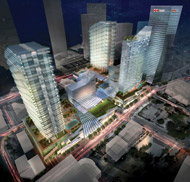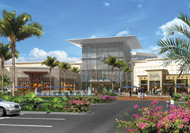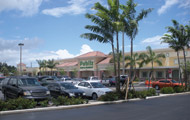|
COVER STORY, AUGUST 2012
FLORIDA RETAIL REGAINS MOMENTUM
Increased activity in several markets shows continued improvement.
Savannah Duncan
With its warm climate, strong tourism base and growing population, Florida’s retail market continues to attract retailers, investors and developers. Several retailers are expanding in the market, including fast-casual restaurant concepts and discount retailers. Investors, such as REITs and 1031 exchange buyers, are snatching up Class A centers and single-tenant retail properties.
 |
Swire Properties broke ground on the
$1 billion Brickell CitiCentre in Miami in June. The mixed-use development
will feature 520,000 square feet of retail space. |
|
Even development is making a comeback, with two significant projects breaking ground this year. In June, Swire Properties broke ground on the $1 billion Brickell CitiCentre, a mixed-use development located in Miami. Upon completion in 2015, the project will include 520,000 square feet of retail space.
Another large project in the pipeline is the $315 million, 880,000-square-foot University Town Center in Sarasota. Taubman Centers and Benderson Development, the developers of the project, anticipate breaking ground before year’s end, with completion slated for fall 2014. The mall will include an 80,000-square-foot Saks Fifth Avenue, a 160,000-square-foot Macy’s and a 180,000-square-foot Dillard’s.
Growth is concentrated in major markets, with most smaller markets still stalled. “Conditions are notably improved this year in the major markets where [retail property] sales and leasing activity are showing signs of improvement,” says Ryan Karlin, vice president of retail sales and leasing at Fort Lauderdale-based Stiles Realty. “However, in secondary and tertiary markets, we have not seen much of an uptick.”
 |
Taubman Centers and Benderson Development plan to begin construction on the $315 million, 880,000-square-foot University Town Center in Sarasota by the end of the year. |
|
The retail sector is particularly hot in South Florida, according to Alan Esquenazi, principal of Coral Gables-based Continental Real Estate Cos.
Without a doubt, Miami is one of the strongest retail markets in the state. Miami’s vacancy rate in the second quarter of 2012 was 7.2 percent, down 50 basis points from the second quarter of 2011, according to New York City-based Reis. By comparison, in the second quarter of this year, Fort Lauderdale’s vacancy rate was 11.3 percent, Tampa’s vacancy rate was 12 percent and Orlando’s vacancy rate was 13.7 percent.
“We see positive occupancy and leasing in Florida compared to this time last year,” says Ross Cooper, vice president of asset management, acquisitions and development for Kimco Realty Corp., based in the firm’s Hollywood office. “The progress is encouraging.”
Part of Florida’s uptick is related to continued population growth. “A growing population can cure many problems,” says Beth Azor, president of Davie-based Azor Advisory Services. According to the U.S. Census Bureau, Florida’s 2010 population totaled more than 18.8 million. By 2020, the state’s population is expected to increase to approximately 23.4 million.
Leasing Heats Up
Throughout Florida, leasing activity is on the rise and big-box spaces are starting to fill up. Restaurants, especially the fast-casual segment, and discount retailers are expanding most rapidly.
“At this time last year, I didn’t have much interest on five or six vacant restaurants and bank branches,” says Scott Corbin, director of retail services for Colliers International’s Orlando office. “At this point, I have offers to buy or lease with backup offers in place.”
In South Florida, almost every big box that has been vacated during the past few years has been backfilled, Esquenazi adds.
Regency Centers, which owns 56 centers in Florida, had its best leasing year in the history of the company, says Mike Kinsella, senior vice president and senior market officer of Regency Centers’ Tampa office. During the next 12 to 18 months, the company’s goal is to reach 95 percent occupancy at its 4.8 million-square-foot Florida portfolio, which includes mostly grocery-anchored centers.
“Retailer expansion plans are growing in terms of the number of stores [by which they are expanding],” says Chuck Taylor, senior vice president of leasing in Madison Marquette’s Boca Raton office. “There’s a genuine desire to try to get back to real expansion versus the last couple of years, which has just been a little here or there.”
Restaurants such as Chipotle, Subway, Burger 21, Smashburger and Panera Bread have solid expansion plans in Florida. “I don’t know of many restaurants that are not coming into our market,” says Richard Lackey, founder and chairman of Palm Beach Gardens-based The Lackey Companies. “Whatever category it is, they are expanding in this market.”
A number of international restaurant concepts are entering the market as well. “For many years, very few foreign restaurant groups would come to America and be successful,” Lackey says. “Now we have more international restaurants coming to America, and many of those are coming to South Florida.” Examples include 100 Montaditos from Spain, Zuma from the United Kingdom, Pardos Chicken from Peru and Giraffas from Brazil.
“Miami is a gateway city,” says John Schupp, senior vice president of Jones Lang LaSalle Retail, based in the firm’s Atlanta office. “We get a lot of international retailers and restaurants that want to expand in the United States. We’re one of the first markets they look at.”
Convenience and gas retailers, like Wawa, are also expanding, says Charlie Boscarino, vice president of leasing for Tampa-based RMC Property Group. Wawa opened its first Florida location in Orlando in August, and has plans to build 12 to 15 more locations with RMC Property Group in the state.
Larger retailers such as Walmart, Costco, Sports Authority and Hobby Lobby are actively pursuing deals. Additionally, Trader Joe’s opened its first Florida store in February in Naples, and is opening its second store in the state in Sarasota in September.
Cooper thinks that national, credit tenants that want to expand their footprints in Florida could spur some new development in the future. “National tenants want to grow, but opportunities for appropriate space are limited with the current supply,” he says.
Discount retailers, including dollar store chains and apparel chains such as Ross Dress For Less, Marshalls and T.J. Maxx, have expanded rapidly in Florida as well. Boscarino says there has been a change in the way that consumers view these kinds of retailers, which has spurred strong growth activity.
“There’s not the stigma that there used to be,” he says. “People are proud to say how much money they saved. As a result, off-price retailers can go into areas they’ve never been in before.”
The surge in discount retail growth has proven positive for outlet centers such as Silver Sands Factory Stores in Destin. Five new stores are slated to open at the center this year, bringing it to 97 percent occupancy, says Myra Williams, vice president of marketing for Miramar Beach-based Howard Group, which owns and developed the property.
One thing that has changed as a result of the recession is the way leasing agents go about procuring tenants. “When the recession occurred and national retailers went from opening 100 new stores [annually] to three, we realized that to increase our centers’ occupancies, we needed to look toward a different audience, like local mom and pop tenants with multiple locations,” Azor says. “[They are] great tenants, well capitalized and have a great following.”
As activity increases, landlords are gaining more leverage in lease negotiations. “In some of our Class A centers, we’re finding the ability to push negotiations our way,” says Tom Meredith, senior vice president of leasing for Equity One’s Miami Beach office. “It all depends on the center and how badly [the landlord] wants to make the deal.”
Corbin adds that landlords are going to stretch for quality and credit-rated tenants, and that some smaller tenants won’t receive the kinds of deals they would have during the recession. “A lot of tenants have unrealistic expectations on what they can receive as far as rent abatement, improvement allowances or concessions,” he says. “The time to strike those deals was a year or two ago.”
While concessions may be waning in larger cities, smaller cities such as West Palm Beach and Rockledge have economic development initiatives and incentives in place to attract retail tenants to certain areas.
Rockledge, for example, offers relaxed land development regulations, expedited permitting and a mixed-use zoning category that allows for a wider variety of uses, provided a tenant meets certain architectural and site design criteria. This year, two new tenants have opened in the district, including a beer and wine bar as well as a diner.
“We have six retail centers in our district, two of which are doing extremely well,” says Lisa Nicholas, redevelopment specialist for the Rockledge Community Redevelopment Agency. “We just want to see the properties leased up and vacancy rates decrease.”
Downtown West Palm Beach has also seen a surge in restaurant tenants. Kabuki and Palm Sugar, two Asian restaurant concepts, recently opened, as did Grimaldi’s Pizza. Bar Louie will be opening later this year. Raphael Clemente, executive director of the West Palm Beach Downtown Development Authority, says unique mom and pop retailers and small boutiques are thriving as well.
“We offer a large project incentive, which targets leasehold improvements,” he says. “We developed that program with the goal of subdividing and renovating the large vacant spaces we have.” Tenants can receive up to $100,000 in order to renovate a space. The ability of the city to offset that cost has been the push needed to secure several tenants, Clemente adds.
Investors Bet On Florida
Retail properties in Florida continue to be popular with investors looking to enter the market. Several notable sales have occurred during the last 6 months, and both value-add and core assets are trading in the market. For the entire state, approximately 60 shopping centers larger than 25,000 square feet have sold in the first half of 2012.
“Activity has almost doubled year over year,” says Kane Morris-Webster, senior associate based in the Orlando office of Colliers International. “Most investors are looking for something that’s going to be stable and continue to hold value.”
Banks have really started to come back to fund acquisitions, says Jeff Tanner, vice president of Coldwell Banker Commercial NRT’s Maitland office. “But they want to work with companies that have a track record of success.”
In July, Vornado Realty Trust purchased a 167,000-square-foot retail property located at 1100 Lincoln Road in Miami Beach for $132 million. Tenants include Regal Cinemas, Anthropologie and Banana Republic. The sale is the largest sale in Florida year-to-date. The acquisition was partially funded by a new $66 million mortgage loan.
Inland Real Estate is another REIT that has been active in Florida. The company has both bought and sold properties during the last 6 months. For example, Inland American Real Estate Trust sold the 236,679-square-foot Lakewood Shopping Center in Margate to North American Development Group for $31.5 million. Additionally, Inland Real Estate Acquisitions purchased the 119,590-square-foot Saxon Crossings, located in Orange City, for $20.7 million from Saxon Crossing Partners.
Equity One, which owns 91 retail properties totaling approximately 9.49 million square feet in Florida, has started to leave some of the smaller markets in the state and acquire properties in more major markets. “We are transitioning into a different kind of portfolio, one of quality and high-density markets,” Meredith says. “Good quality properties are hard to find.”
Taylor says Madison Marquette is in the process of raising capital and exploring new acquisition opportunities, including properties in Florida’s major markets. “We also see third-party management opportunities growing in Florida as well and we are working on a number of proposals,” he adds.
Coral Springs-based Tulepan Management is also in heavy acquisition mode this year. Randy Tulepan, vice president of operations, says the company has been raising equity and is prepared to purchase up to $100 million of retail properties in South Florida this year.
1031 exchange investors have also been increasingly active in the market. “1031 exchange investors have a lot of cash and we are getting multiple offers on single-tenant properties because of them,” says Cynthia Shelton, director of investment sales for the Orlando office of Colliers International.
“Investors have realized they are about to miss out on opportunities for good pricing so they’ve really stepped up,” Tanner says. “They are paying a little bit more for locations and cap rates are changing a little bit too.”
For core assets, capitalization rates are between 7 percent and 7.5 percent, says Shelton. Single-tenant properties such as Dollar General stores where the tenant has signed a 15-year lease are posting capitalization rates of 7.25 percent to 7.75 percent.
“For any property with more than 10 years remaining on the lease, cap rates have really compressed,” Morris-Webster says.
In March, a 14,490-square-foot Walgreens sold for $10.03 million to a local developer. According to Marcus & Millichap, which represented the seller, the sale price was the highest amount paid for a Walgreens in the Southeast since 2010.
Development Rebounds
While retail development has been slow statewide, there are a few new projects and redevelopment projects planned, in addition to Swire Properties’ Brickell CitiCentre and Taubman’s University Town Center.
“There is some new development occurring, primarily in South Florida,” Karlin says. “Most of the shopping centers we see in the pipeline are still in the pre-development stages but are getting close to breaking ground. Most of these projects will be driven by discount retailers and grocers.”
In North Florida, Howard Group is building a $10 million, 40,000-square-foot Montecito 10 movie theater at the 215,000-square-foot Grand Boulevard Town Center, the specialty retail component of the 4,200-acre mixed-use development Grand Boulevard at Sandestin in Miramar Beach. Howard Group owns the center with Merchants Retail Partners. The center is only 50 percent completed, so it will continue to grow and expand as the market allows.
 |
A 45,000-square-foot Publix recently opened at Regency Centers’
117,124-square-foot Boynton Lakes Plaza, located in Boynton Beach. |
|
In June, Publix opened at Regency Centers’ 117,124-square-foot Boynton Lakes Plaza, located in Boynton Beach. The new 45,000-square-foot anchor completed the redevelopment of the center.
Tulepan says that his company also has some growth opportunities at Coral Square Shoppes in Fort Pierce. Currently, the center is 45,000 square feet, but has the potential to grow to 180,000 square feet.
Many of the projects that are coming out of the ground have already secured several tenants. For example, Kite Realty Group’s 258,000-square-foot Delray Marketplace started construction in March after securing leases with Publix, Frank Theaters, Chico’s, White House Black Market, Charming Charlie, Jos. A. Bank and more. The $28 million development is slated to open in mid-November.
 |
Jones Lang LaSalle is overseeing redevelopment efforts at TIAA-CREF’s Palms at Town & Country in Fort Lauderdale. Upon completion, the property will total 700,000 square feet of retail space. |
|
Several companies are focused on redevelopment activity. Jones Lang LaSalle is redeveloping Palms at Town & Country in Fort Lauderdale on behalf of TIAA-CREF. Phase II is under construction, and will include two retail anchor spaces totaling 73,070 square feet and two 6,000-square-foot, stand-alone restaurant pads. Completion is slated for late 2013. Upon completion, the property will total more than 700,000 square feet.
While the industry buzzes about big-box retailers downsizing their stores, there are a number of tenants expanding existing space within centers. Boscarino says stores like Rainbow, Beall’s Outlet and Dollar Tree have expanded in RMC Property Group’s centers. “It’s the opposite of some of the big-box retailers, discounters have expanded their footprints,” he says.
Howard Group has signed a few tenants to larger stores as well. In Silver Sands, which the company owns with Simon Property Group, nine stores have undergone remodeling or relocation, and two stores have expanded. “We try to bring the best prototype retailers have in their company to Silver Sands, so when they re-sign their lease after 10 years, they might resize or remodel as well,” Williams says.
Continued Growth
As the economy continues to improve, so will Florida’s retail sector. The state’s strong tourism base and growing population will fuel the fire, and as retail spaces start to fill up, more new development will occur.
“We are encouraged by the modest but increased activity in consumer spending and its impact on absorption as well as improving fundamentals, including better retail sales and a slightly more relaxed lending environment,” Karlin says. “We are optimistic that the momentum we have experienced in the first half of the year will continue throughout 2012 and lead us into an even better 2013.”
©2012 France Publications, Inc. Duplication
or reproduction of this article not permitted without authorization
from France Publications, Inc. For information on reprints
of this article contact Barbara
Sherer at (630) 554-6054.
|
